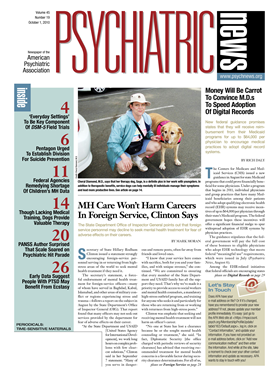Once, psychiatric epidemiologists could complain about a lack of data describing children's mental health, but an increasing number of more sophisticated national surveys have begun to fill that gap.
Both the National Institute of Mental Health (NIMH) and the Centers for Disease Control and Prevention (CDC) have developed new studies or added mental health questions to existing surveys, said speakers at the National Conference on Health Statistics in Washington, D.C., in August.
For instance, in 1999 NIMH supported adding dimensional measures of children's mental health to the National Health Interview Survey (NHIS) and the National Health and Nutrition Examination Survey (NHANES), said Kathleen Merikangas, Ph.D., a senior investigator and chief of the Genetic Epidemiology Research Branch at NIMH.
Then, in 2001, 2002, and 2003, the NHIS measured symptoms of serious emotional disorders in children using the Strengths and Difficulties Questionnaire. About 5 percent of children met criteria for a serious emotional disturbance. Since the same set of questions has been translated into 20 other languages, the results in the United States can now be compared with samples from around the world.
Like many surveys, however, the NHIS depends on participants to recall a medical history, a source of potential bias.
“That is why it's important to get a life-course picture with reliable measures,” said Merikangas. “You need to know whether depression has been going on for 10 years or whether it first occurred in the previous year.”
The NHANES involves an interview in the home, followed by a medical examination and questions about diet and health. There is also a follow-up phone interview. The survey oversamples certain populations such as African Americans, Mexican Americans, low-income whites, people over age 60, and adolescents aged 12 to 19.
Trying to Fill Huge Knowledge Gap
“There is a huge gap in our knowledge of adolescents and young adults, even though this is a transition period that often sees the beginning of lifelong problems,” said Merikangas.
The surveys can often open new directions for research. One study published by Merikangas and colleagues, for example, found that attention-deficit/hyperactivity disorder (ADHD) was strongly associated with enuresis.
“That may indicate that enuresis is an indication of slow brain maturation and a possible precursor of other emotional and mental disorders,” she said.
However, there is often a lack of prospective cohort data in mental health surveys. Merikangas has collaborated with European colleagues to obtain that kind of data.
“We also need better measures of disability and impairment and a combination of categorical and dimensional measures,” she said.
The CDC Is on the Line
The CDC has developed a telephone survey system that can be adapted to collect health data quickly to guide policy or address emergent health issues, said Kathleen O'Connor, M.P.H., of the CDC's National Center for Health Statistics in Bethesda, Md.
The State and Local Area Integrated Telephone Survey (SLAITS) mechanism uses a complex sampling design to garner data on both children and adults, said O'Connor.
SLAITS can collect representative data at the national, regional, state, and local levels to identify rare, small population groups; find family and parent-level data when studying children; and track hard-to-reach, mobile populations through increased (and expensive) use of cell-phone numbers.
In the last 10 years, the service has conducted three iterations of the National Survey of Children With Special Health Care Needs, which captures some mental health information. Those survey data can be compared with data from the National Survey of Children's Health.
The survey can be very selective, if needed. One study looked at the subset of children with special needs who were adopted without a biological parent in the household and who had posttraumatic stress disorder, attachment disorder, oppositional defiant disorder, or conduct disorder.
Researchers learned that children with special health care needs have much higher rates of ADD/ADHD (30 percent) compared with the general population (6.4 percent), for example.
Researchers can also analyze children's health and mental health status with reference to their parents' mental and emotional health status.
These and related surveys have been used to develop National Adolescent Health Information Center reports, the Commonwealth Fund State Scorecard on Health System Performance, mental health needs assessments, and funding allocations, said O'Connor.
